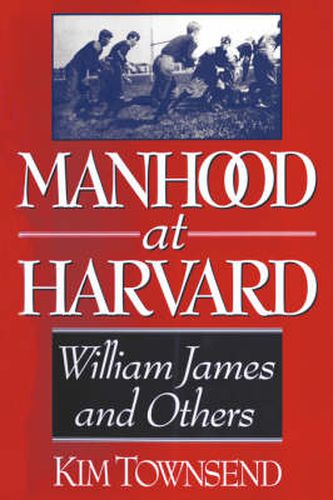Readings Newsletter
Become a Readings Member to make your shopping experience even easier.
Sign in or sign up for free!
You’re not far away from qualifying for FREE standard shipping within Australia
You’ve qualified for FREE standard shipping within Australia
The cart is loading…






This title is printed to order. This book may have been self-published. If so, we cannot guarantee the quality of the content. In the main most books will have gone through the editing process however some may not. We therefore suggest that you be aware of this before ordering this book. If in doubt check either the author or publisher’s details as we are unable to accept any returns unless they are faulty. Please contact us if you have any questions.
A century ago, while feminism began to alter our perception of the roles of women, a very different movement transformed the American ideal of manhood. Its defining terms were most clearly set forth at Harvard University in the decades following the Civil War. During those years, more than ever before in our culture, men became conscious of themselves as men. Kim Townsend introduces us to the men at Harvard who were the most influential supporters and vocal critics of the new ideal of manhood. At the center was Harvard psychologist and philosopher William James, whose own personal perspective was very much a man’s perspective, a masculine or manly one. His career and writing mirrored the ways Harvard responded to the pressures of the era. Manhood at Harvard has a rich and varied cast of characters - indeed, some of the most influential thinkers of the time. There is Charles William Eliot, the university president who transformed a somewhat provincial college that seemed almost an extension of a New England prep school into a world-class university that was taking its first steps towards America’s ethnic diversity. W. E. B. Dubois pointed out the racial and gender assumptions implicit in Harvard’s ideal, while George Santayana, another Harvard outsider, recognized James’s masculine directness but turned away from his philosophy. Townsend’s fascinating study penetrates a distinctive culture, the legacy of which has reverberated powerfully - and provocatively - in education, politics, and society throughout the twentieth century.
$9.00 standard shipping within Australia
FREE standard shipping within Australia for orders over $100.00
Express & International shipping calculated at checkout
This title is printed to order. This book may have been self-published. If so, we cannot guarantee the quality of the content. In the main most books will have gone through the editing process however some may not. We therefore suggest that you be aware of this before ordering this book. If in doubt check either the author or publisher’s details as we are unable to accept any returns unless they are faulty. Please contact us if you have any questions.
A century ago, while feminism began to alter our perception of the roles of women, a very different movement transformed the American ideal of manhood. Its defining terms were most clearly set forth at Harvard University in the decades following the Civil War. During those years, more than ever before in our culture, men became conscious of themselves as men. Kim Townsend introduces us to the men at Harvard who were the most influential supporters and vocal critics of the new ideal of manhood. At the center was Harvard psychologist and philosopher William James, whose own personal perspective was very much a man’s perspective, a masculine or manly one. His career and writing mirrored the ways Harvard responded to the pressures of the era. Manhood at Harvard has a rich and varied cast of characters - indeed, some of the most influential thinkers of the time. There is Charles William Eliot, the university president who transformed a somewhat provincial college that seemed almost an extension of a New England prep school into a world-class university that was taking its first steps towards America’s ethnic diversity. W. E. B. Dubois pointed out the racial and gender assumptions implicit in Harvard’s ideal, while George Santayana, another Harvard outsider, recognized James’s masculine directness but turned away from his philosophy. Townsend’s fascinating study penetrates a distinctive culture, the legacy of which has reverberated powerfully - and provocatively - in education, politics, and society throughout the twentieth century.